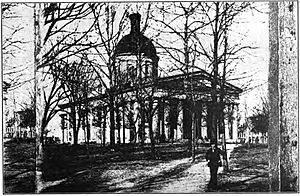Edward Ralph May facts for kids
Edward Ralph May (born May 10, 1819 – died August 2, 1852) was an American lawyer and politician. A lawyer helps people with legal problems, and a politician works in government. He is remembered for being the only person at the Indiana Constitutional Convention of 1850 to vote for African American people to have the right to vote. This right is called suffrage.
Contents
Edward May's Early Life and School
Edward May was born in Hartford, Connecticut. He started Amherst College when he was only 14 years old. Later, he moved to Yale University and finished his studies there in 1838. After college, he taught school and worked as a lawyer in Norwich, Connecticut.
In 1843, May moved to Angola, Indiana. This was a new town known for being against slavery. He became the county's prosecuting attorney for two years, from 1847 to 1848. A prosecuting attorney is a lawyer who works for the government to bring charges against people accused of crimes.
May was a member of the Democratic Party. In 1849 and 1850, he was elected to the Indiana House of Representatives. He represented both Steuben and DeKalb counties. Because of a special rule, his election in 1850 also made him a delegate to the Constitutional Convention of 1850. A delegate is a person chosen to represent others at a meeting.
Voting Rules in 1816 Indiana
Indiana's first constitution, which is like a rulebook for the state, was made in 1816. It said that only white men over 21 who had lived in the state for one year could vote. It did not specifically stop African Americans or other people of color from voting, but it only gave the right to vote to white men.
The Constitutional Convention of 1850 decided to make a new rule that would clearly stop African Americans from voting. However, they still talked about whether to let them vote.
Edward May Fights for Voting Rights

On October 28, 1850, the Convention discussed two requests about African American rights. One was from people of color in Allen County. The other was from people in Steuben County who supported African Americans.
A delegate named Schuyler Colfax suggested that a committee should look into whether the people of Indiana should vote separately on the issue of allowing African Americans to vote. Another delegate, George Berry, wanted to change this. He wanted the committee to be told directly to approve a rule that would let "negroes and mulattoes" vote in all elections.
Edward May then spoke up. He suggested changing Berry's idea to let the committee propose "restrictions and qualifications" for African American voters. This might not sound like strong support, but it allowed May to give a powerful speech. He criticized how many delegates were acting like hypocrites about racial issues.
May believed that African Americans should have the right to vote, maybe with some rules like owning property. He compared these possible rules to those for immigrants from Sweden and Germany. They were not immediately given all the rights of citizenship. May's main goal was to make the delegates think differently. He wanted them to stop being completely against African American suffrage.
May said that he would give African American men the right to vote with certain rules. But he knew that the Convention had already decided that African Americans would never vote in Indiana. He said he had to accept their decision, but it did not feel right to him.
May also made an ironic point. He noted that the majority of delegates were happy to tax African Americans, but they would not let them vote. He said, "We already allow him the privilege of supporting our government by paying his taxes with the rest. Gentlemen see no danger in that. Then let us grant him the right to vote, and thus participate in the government which he assists to support."
May's idea to change Berry's proposal failed. When Berry's original idea was voted on, even Berry himself did not support it. This meant that Edward May was the only delegate, out of 122, who voted for African American men to have the right to vote without special rules.
New Voting Rules in 1851
On August 4, 1851, the people of Indiana voted to approve the new constitution. The new rules in Article 2, Section 5, clearly stated: "No Negro or Mulatto shall have the right of suffrage."
The 1851 constitution also included another rule. It said that no new African American people could move into the state. This rule was voted on separately. Edward May was against this ban on immigration. His home county, Steuben, was one of only three counties in Indiana that voted against stopping African Americans from moving into the state.
May's Later Life
After the Convention, Edward May went back to Angola. In 1851, he married Nancy C. Orton. He did not try to be elected to the legislature again. In 1852, May and his wife moved to Saint Paul, Minnesota. Sadly, both of them died there, likely from a serious illness called cholera.
Images for kids
 | John T. Biggers |
 | Thomas Blackshear |
 | Mark Bradford |
 | Beverly Buchanan |

